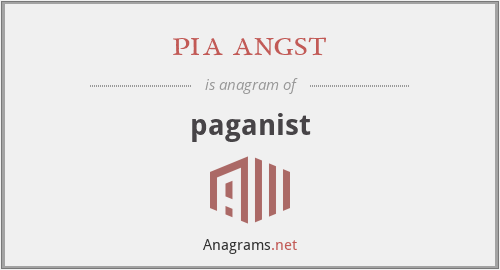What anagrams are available for paganist?
This page is about an anagram for the word pia angst that can be used in word games, puzzles, trivia and other crossword based board games.
pia angst
Translation
Find a translation for pia angst in other languages:
Select another language:
- - Select -
- 简体中文 (Chinese - Simplified)
- 繁體中文 (Chinese - Traditional)
- Español (Spanish)
- Esperanto (Esperanto)
- 日本語 (Japanese)
- Português (Portuguese)
- Deutsch (German)
- العربية (Arabic)
- Français (French)
- Русский (Russian)
- ಕನ್ನಡ (Kannada)
- 한국어 (Korean)
- עברית (Hebrew)
- Gaeilge (Irish)
- Українська (Ukrainian)
- اردو (Urdu)
- Magyar (Hungarian)
- मानक हिन्दी (Hindi)
- Indonesia (Indonesian)
- Italiano (Italian)
- தமிழ் (Tamil)
- Türkçe (Turkish)
- తెలుగు (Telugu)
- ภาษาไทย (Thai)
- Tiếng Việt (Vietnamese)
- Čeština (Czech)
- Polski (Polish)
- Bahasa Indonesia (Indonesian)
- Românește (Romanian)
- Nederlands (Dutch)
- Ελληνικά (Greek)
- Latinum (Latin)
- Svenska (Swedish)
- Dansk (Danish)
- Suomi (Finnish)
- فارسی (Persian)
- ייִדיש (Yiddish)
- հայերեն (Armenian)
- Norsk (Norwegian)
- English (English)
Definition
What does paganist mean?
- paganist
- Paganism (from classical Latin pāgānus "rural", "rustic", later "civilian") is a term first used in the fourth century by early Christians for people in the Roman Empire who practiced polytheism, or ethnic religions other than Judaism. In the time of the Roman empire, individuals fell into the pagan class either because they were increasingly rural and provincial relative to the Christian population, or because they were not milites Christi (soldiers of Christ). Alternative terms used in Christian texts were hellene, gentile, and heathen. Ritual sacrifice was an integral part of ancient Graeco-Roman religion and was regarded as an indication of whether a person was pagan or Christian. Paganism has broadly connoted the "religion of the peasantry".During and after the Middle Ages, the term paganism was applied to any non-Christian religion, and the term presumed a belief in false god(s). The origin of the application of the term "pagan" to polytheism is debated. In the 19th century, paganism was adopted as a self-descriptor by members of various artistic groups inspired by the ancient world. In the 20th century, it came to be applied as a self-descriptor by practitioners of modern paganism, modern pagan movements and Polytheistic reconstructionists. Modern pagan traditions often incorporate beliefs or practices, such as nature worship, that are different from those of the largest world religions.Contemporary knowledge of old pagan religions and beliefs comes from several sources, including anthropological field research records, the evidence of archaeological artifacts, and the historical accounts of ancient writers regarding cultures known to Classical antiquity. Most modern pagan religions existing today express a world view that is pantheistic, panentheistic, polytheistic or animistic, but some are monotheistic.
Embed
Citation
Use the citation below to add this anagram to your bibliography:
Style:MLAChicagoAPA
"pia angst." Anagrams.net. STANDS4 LLC, 2025. Web. 12 Mar. 2025. <https://www.anagrams.net/term/25722343>.







Discuss this paganist anagram with the community:
Report Comment
We're doing our best to make sure our content is useful, accurate and safe.
If by any chance you spot an inappropriate comment while navigating through our website please use this form to let us know, and we'll take care of it shortly.
Attachment
You need to be logged in to favorite.
Log In